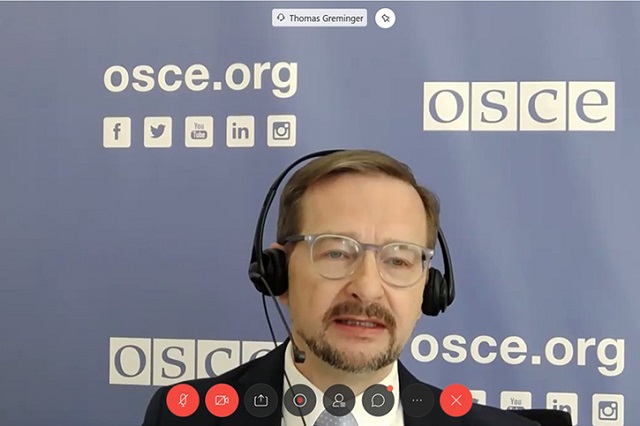COPENHAGEN, 29 May 2020 – Addressing the leaders of the OSCE Parliamentary Assembly in an online forum today, OSCE Secretary General Thomas Greminger discussed the challenges that COVID-19 is posing to multilateral diplomacy and highlighted how the OSCE has responded with flexibility and resilience in the face of the crisis.
Stressing that the lessons learned from this experience can help ensure that the OSCE is well prepared to deal with future crises, Greminger pointed out that COVID-19 has demonstrated the need to revitalize multilateralism and build a co-operative international order.
“It is now clear that the COVID-19 pandemic is a major geopolitical event of historical proportions,” Greminger said. “A pandemic is never welcome, but this one has arrived at a very delicate juncture. The multilateral system was already under enormous strain, with tensions and mistrust already growing for quite some time.”
Greminger regretted that despite UN Secretary-General Antonio Guterres’s call for a global ceasefire, the window of opportunity for peace is quickly closing.
Read also
“In our region, the pandemic is having an impact on conflicts, on the civilian populations affected by them, and on the various formats attempting to address them. Conflict resolution has become harder, and progress has slowed,” he said.
Nevertheless, he noted that the organization has adapted well to new realities, with videoconferencing continuing to provide a platform for inclusive diplomatic dialogue. OSCE field operations have also quickly adapted to the new situation, offering both a range of short-term and medium-term support to their host countries, he said. Emerging themes for support include crisis management and preparedness, corruption prevention, gender-related impacts of the crisis; increased focus on combatting human trafficking, and in Central Asia, border management issues related to COVID-19.
In his remarks, OSCE PA President George Tsereteli (Georgia) noted that the OSCE has demonstrated its effectiveness during the pandemic, highlighting in particular the areas in which the institutions of the OSCE have collaborated. He said that going forward, the OSCE must be even more united. He also noted that COVID has highlighted the need to consider reforms of rules and working procedures in order to adjust for possible crises in the future.
Members raised numerous issues in the discussion with SG Greminger, with questions posed about connectivity, protracted conflicts, fake news, and how to ensure that the OSCE remains relevant through the promotion of an approach to COVID-19 based on the three dimensions of security.
Greminger said that the pandemic has highlighted gaps in digital connectivity, which the OSCE is addressing through a number of projects, including in the Caspian Sea basin. Regarding mediation efforts on the Nagorno-Karabakh conflict, the Secretary General said that the sides in the conflict are participating in online meetings, but it is important to resume in-person meetings for real progress to be made. Greminger discussed how the OSCE is working to determine a multidimensional approach to addressing the COVID-19 crisis, including by ensuring that any restrictions governments take on fundamental freedoms are proportionate and time-bound.
Taking note that the OSCE budget was adopted yesterday, PA Secretary General Roberto Montella pointed out that the OSCE does an extraordinary amount of work with limited financial resources.
Lord Peter Bowness, OSCE PA Vice-President and Chair of the Sub-Committee on Rules of Procedure and Working Practices, made a presentation on the advisability of reviewing the OSCE PA’s Rules of Procedure, including finding ways to ensure the continuity of Assembly functions during times of crisis.
In the general discussion, OSCE PA leaders agreed that the COVID-19 crisis offered a good opportunity to make a general review of the OSCE PA’s working procedures.
OSCE PA
Photo: Thomas Greminger

























































